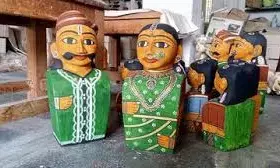Once Upon A Time in UP…
Lucknow Gup

Uttar Pradesh (UP) has been one of the poorest provinces of the country for a long time. But despite decades of want and poverty, citizens from different walks of life in the city had followed a certain decorum.
Society had deliberately nursed over the years, a way of living together where conflicts were consciously minimised in the neighbourhood with all those who had followed a different faith and had different food habits. To attack or to try and shame a fellow citizen was discouraged in daily life.
Efforts were made to appreciate and not to envy or hate the other. The idea was to share a more peaceful way of life even by ordinary citizens so that day to day business could thrive uninterrupted by fear and hate of fellow human beings next door. This decorum had filtered down from those in power who had often erred but were forgiven for at least trying to behave themselves in the future.
Even the way to deal with anger and annoyance was charming in the city. Imagine a fruit vendor telling a miserly buyer, “even the mango decays in shame at the price you offer”.
Aggression was often diverted into creative activities like pounding the life out of a piece of silver to make paper thin sheets used to decorate meals. Children were encouraged to go fly a kite instead of throwing stones at each other.
Attempts were made to translate the usual disappointments and gloom in life into soul searching poetry, or heart thumping songs and foot tapping dance performances. And all those who were unable to compose poetry, sing or dance the environment of the city was such that it invariably turned them into connoisseurs of literature and activities involving aesthetics.
Seasonal festivals were eagerly awaited and celebrated together to often help wash away grudges and rancour of the past. It was considered crude to target other human beings for being the cause of all societal and personal problems.
For a century or so, the city was covered under a blanket of dream-like demeanour that the world expected would last forever.
When Wit Was Valued
The politeness practiced by politicians once was equally legendary.
I have been in and out of the state Assembly press gallery since the 1970s.
Many decades ago I enjoyed reporting, and listening to the legislature's debate. I had particularly taken pride in the witty comments made by my father S. M. Jaffar, two term Member of the Legislative Council (MLC) from Jaunpur constituency that had made me smile.
One day I heard my father defend the policies of the Congress Party in UP and recalled him suggesting to members of the former Bhartiya Jana Sangh (BJS) to use the oil lamp to light up their life. At that time the BJS had sat on the opposition benches and had created a raucous over the shortage of power in the state in the midst of high summer.
The entire house of legislatures had burst into unending laughter at the imagery as the oil lamp was the election symbol of the BJS. The BJS is the name of the right wing party that had existed from 1951 to 1977 as the political arm of the Rashtriya Swayamsevak Sangh (RSS).
The BJS was the Hindu nationalist organisation before it merged with other political parties including Left and Centre-Left parties against the policies of the then Prime Minister Indira Gandhi and her Indian National Congress. Together the Janata Party was formed in 1977.
Besides all lust for power and wealth, and political differences had seldom stood in the way of human relationships enjoyed by most citizens with each other. Being in different political parties did not affect the friendship of my father with Chandikadas Amritrao Deshmukh affectionately called ‘Nanaji’ who was a leader of the BJS and full time worker of the RSS.
Although born in Maharashtra, Nanaji’s work had concentrated in UP’s Gorakhpur area in the field of education, health and rural self-reliance. The differences between our different beliefs and faith did not prevent Nanaji from attending my wedding in 1983, or writing to me a letter on the occasion in words that were more beautiful than expressed by any father to a daughter.
In Times of Twitter
Today impropriety in the use of language rules the roost. Especially on Twitter. Decency and dignity, one’s own and of the other be damned!
Civility, politeness are expressions used today by those without guts. The present day bully is of the opinion that gentleness is practiced only by weaklings.
That is why the more rude the vocabulary the more followers people gather on Twitter. That’s it… it is all about the numbers that follow a citizen on social media that matters these days and nothing else.
That is why the award for the most shameless war of words on Twitter goes to members of the Samajwadi Party (SP) and to the IT cell of the ruling party. It is the filthiest war on social media today.
The public display of the social media warriors and the new low in the use of language against each other and against each other’s family members including women and children is difficult to put into print.
Manish Jagan Agarwal, operator of the SP media cell on Twitter was detained by the Lucknow police for his indecent comments on social media for various political figures.
Richa Rajput, a youth wing member of the ruling party in-charge of social media filed a case against the SP’s Twitter handle without mention of the filth that she herself has been tweeting.



